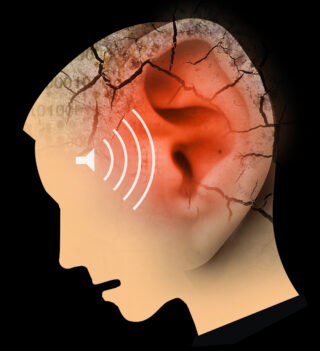
Hearing Healthcare Services, LLC
10111 Martin Luther King Jr. Highway
Suite #102
Bowie, MD
Hearing Healthcare Services, LLC
6196 Oxon Hill Rd.
Suite 240
Oxon Hill, MD 6196 Oxon Hill Rd. Suite 240 Oxon Hill, MD 20745

More Hearing Health Articles
Tinnitus: Ringing In the Ears

Recently there have been a large number of ringing in the ear inquiries which included questions such as: “What can you do about this train noise in my head?”, “This ringing is driving me crazy! Can you help me?”, “Is there a cure for the ringing in my head?”, “What is this constant low buzz that I hear when I go to bed?”
All these concerns can be described as tinnitus (pronounced tin-Night-tus or TIN-it-us), the sensation of noise or ringing when there is no external sound present. Tinnitus can be heard in the form of ringing, buzzing, roaring, clicking, whistling, screeching, static or hissing that may vary in pitch and loudness. Although tinnitus is usually subjective, heard only by the individual, there are a few cases of objective tinnitus where the tinnitus can be heard by others.
Tinnitus is most often the result of noise exposure and in 90% of the cases an indication of hearing loss. It may also indicate other medical conditions such as an acoustic neuroma, an accumulation of ear wax touching the eardrum, otosclerosis, or presbycusis (the aging ear). Ototoxic medications (medications that are harmful to the inner ear) may also cause tinnitus. They may include: analgesics, arthritis medications, antibiotics, antidepressants, antihistamines, antivirals, diuretics, and chemotherapy drugs, to name a few. Consultation with your physician is advised should you note tinnitus with these medications. Often, the tinnitus is temporary, or a non-toxic substitute is available.
Although tinnitus is not treatable with prescriptions or surgery, there are recent breakthroughs in research and treatment that can help manage the tinnitus. Equipment is available to most professionals, called a Tinnometer that can measure the sound type, frequency, and loudness of the tinnitus. Surveys are also available to assess the impact of the tinnitus on your daily life. Finally, tinnitus maskers are included in hearing aids and can be programmed to provide maximum comfort, reduction and possible elimination of the tinnitus with daily use.
How to get help for your tinnitus? The American Speech Language Hearing Association recommends the following:
- See an Audiologist for a comprehensive hearing evaluation. Note: If you have Medicare or an HMO insurance plan, you will need a referral from your family physician.
- Evaluate your tinnitus and its impact on your daily life.
- Get counseling support for your tinnitus and hearing loss.
- Get help to manage your tinnitus.
Over 50 million adults in America are affected by tinnitus. You can get help, today.
Other Articles You May Find of Interest...
- 6 Secrets to Getting Your Stubborn Parent to Try Hearing Aids
- Five Important Reasons To Schedule A Yearly Hearing Exam
- Difficulty Hearing Over The Phone?
- Hearing Loss and Your Overall Health
- Assistive Telecommunications Equipment Provided By the State
- Speech Disability and Using the Telephone
- Keeping Maryland Residents Connected

















